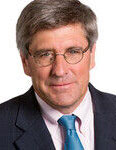Those who live in or near the nation's capital, or routinely travel there, know that the Washington, D.C., region is home to the best airport in the country, Reagan National. It's also home to one of the worst airports, Dulles International.
Reagan is a gem for air travelers. It's beautifully remodeled, usually easy to get through the TSA lines, and contains good restaurants and gates within a few minutes of the main terminal. Most importantly, there is no other major airport in the country that I know of where you can leave downtown and arrive at the airport in less than 20 minutes when traffic isn't heavy. Dulles is almost an hour from D.C., is crowded, and has a crazy train system that doesn't even get you close to the planes but can add another 30 minutes to the travel time.
That is all a prelude to saying that a new bipartisan proposal sponsored by Reps. Hank Johnson (D-Ga.) and Burgess Owens (R-Utah), the Direct Capital Access Act, would increase the number of flights in and out of Reagan National Airport. It's a dream come true for air travelers. It's long overdue.
Reagan was originally built to provide an easily accessible airport for members of Congress to fly in and out of. But it is still operating under archaic and outdated rules that were, believe it or not, written in 1966 -- more than a half-century ago when "The Beverly Hillbillies" was a hit television show.
Reagan is the only airport in the country that is subject to federal restrictions on the number of allowed daily flights. This makes no sense anymore because the airport has just been modernized with more gates. So, increasing the number of inbound and outbound flights during nonpeak times is a no-brainer.
Over the last 50 years, the amount of air travel in and out of D.C. has increased tenfold -- or about three times faster than the number of flights. Now you know why you're getting stuck in the middle seats. If these trends continue, the airlines will have to stuff passengers in the baggage compartments.
Even worse is a "perimeter rule" written when LBJ was president, which restricts the overall number of flights that can take off and land outside a 1,250-mile radius of Washington. That was a noise control regulation because back 40 and 50 years ago, jets were much louder and a nuisance to neighborhoods near the runways. But today, planes are much quieter, and so this issue is now moot (or mute). As a consequence, if you want to fly nonstop to the western cities such as Los Angeles or Seattle, with few exceptions, you have to trek out to Dulles, in the northern Virginia exurban parts of Fairfax and Loudoun counties. Or even further out to BWI, near Baltimore.
The House bill would add 20 to 25 inbound/outbound flights a day from Reagan as part of the Federal Aviation Administration reauthorization bill this fall. Here is an Economics 101 lesson for members of Congress who oppose this reform: If you increase the supply of something, its price goes down. The reform bill would also allow more nonstop flights to Denver, LAX, Salt Lake City, San Antonio, San Francisco and Seattle.
So, who would be opposed to this? The two loudest lobbying voices against the measure are United Airlines and American Airlines. United has a hub at Dulles and so is hotly opposed to diverting air passengers to the rival airport across town. American has a hub at Reagan, and so it doesn't want Delta and Southwest and JetBlue competing with its high-priced flights out of Reagan. There's no legitimate public policy objection; it's just about protecting their turf from competition.
Guess what major airport in the United States has nearly the highest ticket prices? Reagan.
Over the past year, airline costs have risen by 18% and are expected to rise even faster this summer. Federal Trade Commission Chairwoman Lina Khan is trying to blow up airline mergers, for example, the proposed JetBlue and Spirit marriage, because she wrongly says it will raise ticket prices. But she's been silent on the Reagan Airport issue.
What is even more incomprehensible is that the two Democratic senators from Virginia, Mark Warner and Tim Kaine, as well as the northern Virginia congressional delegation, are against the Reagan expansion plan. Hello! Reagan is in northern Virginia, where the population has tripled in 50 years. They don't want more flights?
The bill is estimated to create more than 1,000 new jobs and generate up to $400 million in economic benefit to the capital region. And most of the travelers who will benefit from the lower airline prices live in Virginia.
Someone ought to remind Congress that we are living in 2023, not 1966, and that today, airline travel is for everyone, not just the rich and powerful as it once was when Pan Am and its short-skirted flight attendants ruled the skies and served martinis to wealthy CEOs. Lowering the cost of flying and expanding the convenience of air travel is in everyone's interests -- except for the airlines that are lobbying their pals in Congress to keep ticket prices high.













 Stephen Moore is a senior fellow at Freedom Works. He is also author of the new book: "Govzilla: How The Relentless Growth of Government Is Devouring Our Economy." To find out more about Stephen Moore and read features by other Creators Syndicate writers and cartoonists, visit the Creators Syndicate website at www.creators.com.
Stephen Moore is a senior fellow at Freedom Works. He is also author of the new book: "Govzilla: How The Relentless Growth of Government Is Devouring Our Economy." To find out more about Stephen Moore and read features by other Creators Syndicate writers and cartoonists, visit the Creators Syndicate website at www.creators.com.



